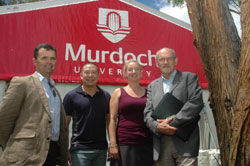



Pork CRC Commercialisation Advances
AUSTRALIA - Cooperative Research Centre for High Integrity Australian Pork (Pork CRC) Manager, Commercialisation and Research Impact, Charles Rikard-Bell, has confirmed that a pipeline of products is being developed which will advance Australia’s pork industry, while, in some cases, earning income for ongoing and future research and development.“Our pipeline has already delivered products such as the Ridley Sow Enrichment Block, which was commercially launched in October last year, after being showcased at the 2016 Pan Pacific Pork Expo. It now has an international patent pending and 170 tonne of product was manufactured in the first batch,” Dr Rikard-Bell explained.

“It all comes down to reducing aggression between sows when they are first mixed in groups, which is now common practice in modern Australian pork production, and our sow enrichment blocks are delivering positive, measurable outcomes.
“Excitingly, we are about to commission some promising research into refining the block to suit weaners and finishers, rather than just sows,” he said.
Addressing Pork CRC’s February commercialisation and adoption committee meeting in Melbourne, Dr Rikard-Bell also highlighted and updated positive developments in his portfolio, including commercialising vaccines for Actinobacillus pleuropneumoniae (APP) and swine dysentery, plus diagnostics tests for Lawsonia and swine dysentery.
“All of these technologies have the potential to impact global pig production, particularly our swine dysentery research.
“The commercial success of AusScan, a joint venture between Pork CRC and Aunir UK, which made online AusScan near infrared reflectance spectroscopy (NIRS) calibrations available to customers worldwide two years ago, is a stand-out example.
“Pork CRC revenue from the AusScan business exceeded A$182,000 in the quarter ending December 2016, with soybean meal measurements in highest demand. Test numbers reached 2799 in the December quarter.
“The future is bright, with Pork CRC’s researchers working with industry to identify and investigate more promising technologies, systems and services that can improve pork production profitability and generate a viable income stream for future R&D,” he said.








